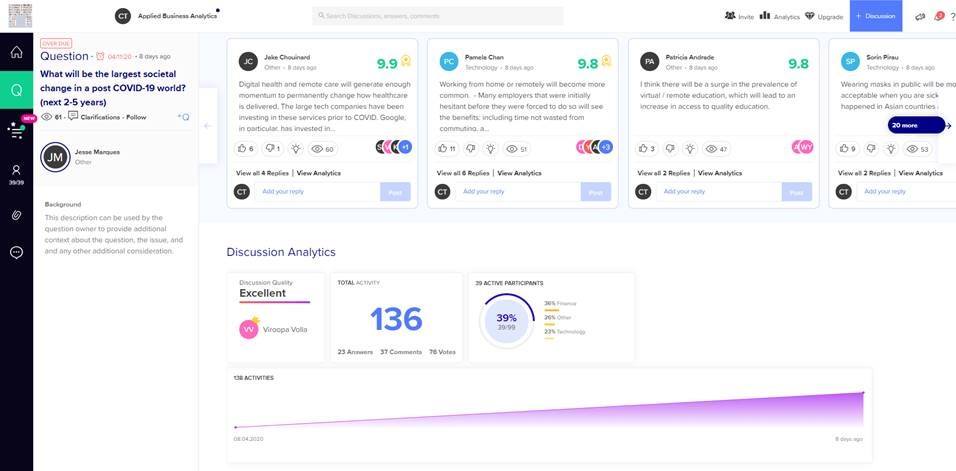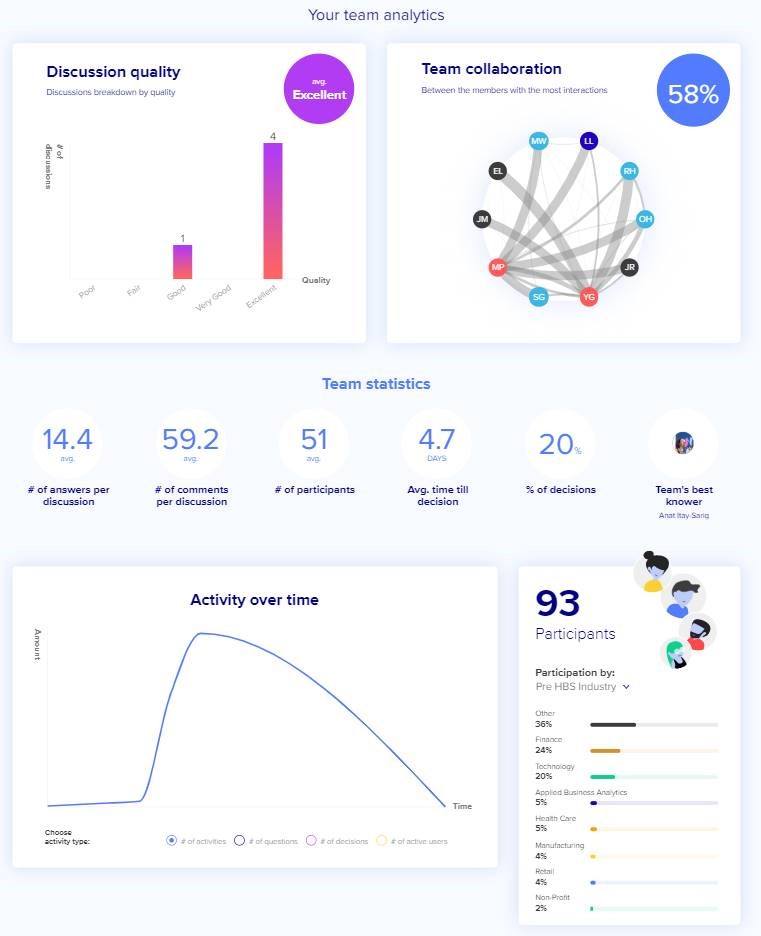Ment.IO Data analytics for team-based decision making

Collaborate remotely without feeling remote
Have you ever been frustrated by endless meetings, ping-pong messaging or long email threads clogging up your inbox? Have you struggled to quickly make sense of all the information? Alternatively, have you found yourself shifting through reams of data analysis wondering how best to make sense of the insights you have gleaned?
Ment.io (Ment) is a software platform that uses data analytics to help organizations make informed and transparent decisions based on their team’s answers and input to business problems.
As modern businesses collect greater amounts of data, the data gathering process is increasingly at risk of missing out on important human insights. Ment seeks to augment our decision making through analyzing human debate.
A simple way to harness the wisdom of your team – how it works
- Users log onto Ment’s website or mobile app to pose a question
- Respondents can ask their own questions or answer an existing question by agreeing, disagreeing or asking for clarification
- A decision algorithm then ranks responses based on the expertise of the user, the amount of disagreement or agreement for the position or degree of clarification sought by other users
- Users could then view analytics summarizing the input along with a decision recommendation.
Driving value creation through analytics
Powering the data analytics is Bayesian networking algorithms which analyze and summarize discussion data. Once a user poses a question or responds to a query, the data is stored in a graph database which acts as a ‘knowledge map’. Branches of the map, called nodes represent different possible outcomes and Ment’s algorithm calculates probabilities for each outcome. The algorithm calculates similarities using pattern recognition applied to agreements and disagreements over the course of the discussion.
“ … a department supporting the same ideas all the time together is probably suffering from the psychological bias of groupthink. The managers will be alerted about this and the department’s score and weight as a group will be lowered. [Using Ment] allows the manager to search across previous discussions allowing modern knowledge analytics and much better use of prior knowledge in future decisions”. – CIO Review
For business decisions makers the output is a clear visual matrix of the discussion and helps guide them to key takeaways based on the wisdom of the crowd.
Figure 1: a typical user dashboard
Figure 2: post-discussion analytics
Value Capture Strategy
Far from a glorified ‘question and answer’ service, Ment creates a cognatic matrix, informing the organization how believable or balanced users are and and how clearly they are being perceived by their counterparts.
To date, they have found particular interest amongst large financial services and technology companies. Ment believes these firms are likely to be more open to new technology or willing to invest in productivity enhancers that can show tangible improvements to the bottom line. In financial services better decision making is correlated with increased profits.
The company offers a 14 day free trial which is graduated to a per-user monthly subscription afterwards. For those companies looking for greater control of data and security, Ment offers on-premise installations in addition to its online platform. It also integrates within existing knowledge management platforms such as Slack and Microsoft Teams so as to reduce push back from employees who may be reluctant to embrace ‘another SaaS product’.
Where to from here?
As a knowledge management tool, Ment is operating in a fast-growing but increasingly competitive environment. Business managers are not short of options in the collaboration and business analytics software space. The global market size for collaboration tools is expected to grow from $31billion in 2019 to $48 billion by 2024. Indeed respondents to a 2018 Deloitte workplace survey suggest up to a 44% decrease in face-to-face meetings over the next three years and 70% increase in usage of collaboration platforms. Notable competitors include Microsoft Teams, Slack, Cisco Systems, Zoom, Dropbox and Atlassian. Other companies like Quora and Kialo offered knowledge management tools that include discussion based features.
In positioning itself for growth, Ment should leverage the increased global acceptance of knowledge management software (hastened by the current COVID-19 world crisis) to position itself as a productivity enhancer for workers separated by geolocation gaps.
One risk faced by users of Ment is a tendency to over-attribute the ‘wisdom of the crowd’ as opposed to one’s own intuition and judgment. By too highly favoring ‘group think’, managers risk making decisions that represent false positives or false negatives. To augment this, Ment could present itself as a tool to improve company culture and worker satisfaction in addition to helping make fact-based business decisions. This would increase the subjectivity of the decisions handled by Ment and thus reduce the downsides of errant judgment.
Sources:
Harvard Business School Case: Ment.io Knowledge Analytics form Team Decision Making
CIO Review: How Leveraging Technology Can Improve Workplace Productivity (LINK)
Forbes: How to run a great meeting during the Coronavirus Outbreak (LINK)
CISION PRWeb: Ment.io Integrates AI Decision-Making into Microsoft Teams for Enhanced Workplace Collaboration (LINK)
CIO Review: Meto.io Optimizing Decision Making to Enhance Productivity (LINK)
TechCrunch: Ment.io wants to help your team make better decisions (LINK)
Deloitte Insights: Human Capital Trends (LINK)





Thanks for writing about this! I agree that group think is a big challenge with their business model. Further, I question how likely employees are to publicly disagree with someone senior on the platform and that it can lend itself to everyone agreeing with the person who has the most power. I think this could be particularly true at large financial institutions – which they are targeting – as they typically have a very rigid hierarchy.